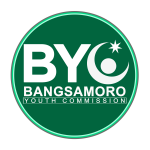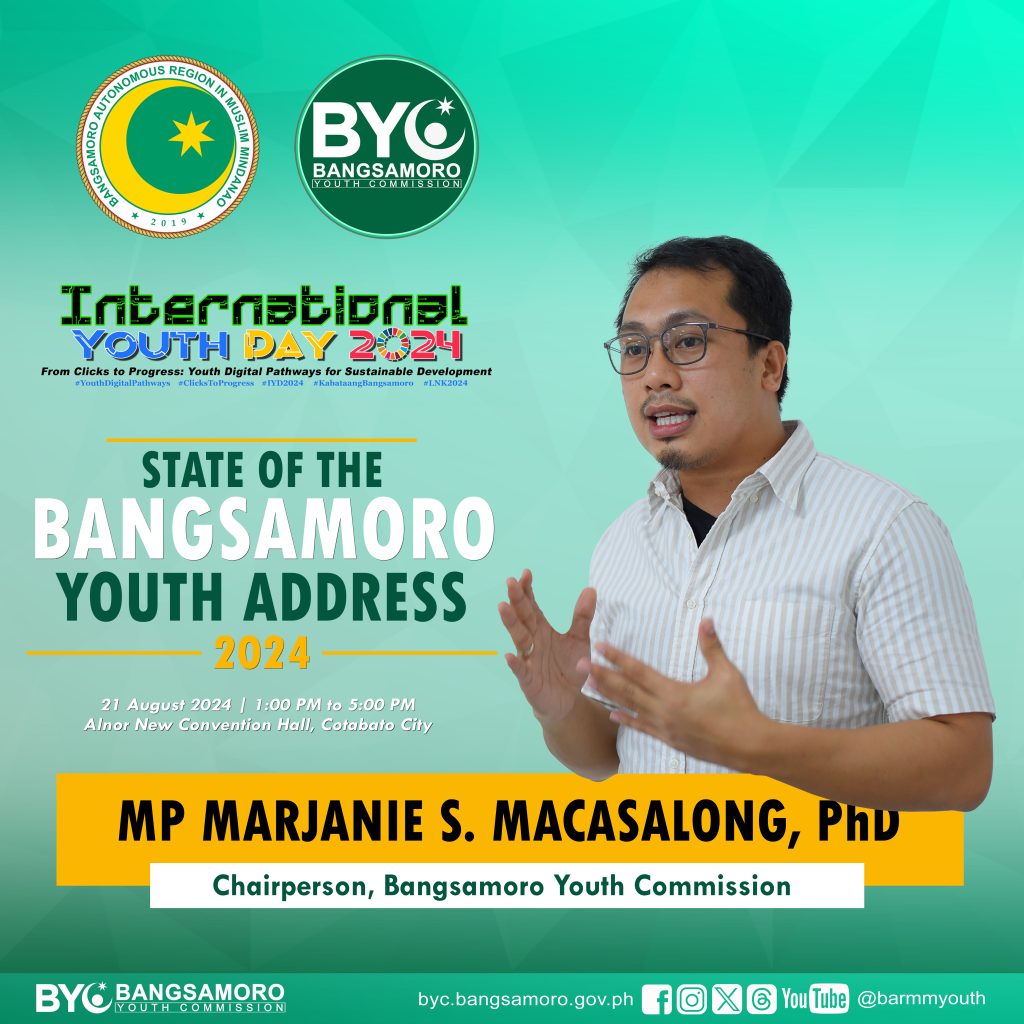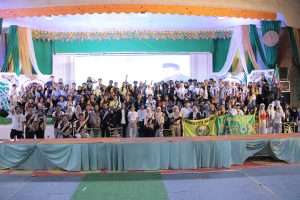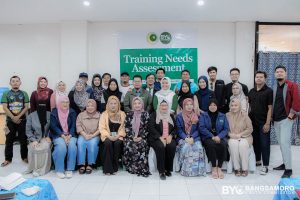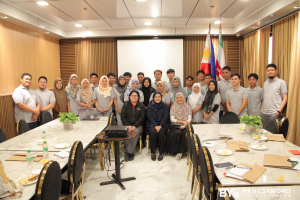FULL TEXT: 5th State of the Bangsamoro Youth Address
I would like to extend my warmest greetings to [mention the dignitaries and guests], and particularly to our cherished youth from diverse backgrounds.
Good afternoon, and as-salamu ‘alaykum wa rahmatullahi wa barakaatuh!
Today, we convene to celebrate the remarkable journey of the Bangsamoro youth—one characterized by resilience, courage, and an unwavering quest for a brighter future, during which they have been guided and supported by the Bangsamoro Youth Commission.
Since the establishment of the BYC in 2020, we have devoted ourselves to honing the potential and mainstreaming the contributions of our youth while raising awareness about the distinct challenges they encounter.
Throughout this journey, we have observed numerous talented youth leaders rising to the occasion, manifesting that the future of the Bangsamoro is indeed promising in their capable hands.
International Youth Day was first commemorated in 2000. Its observance started from a recommendation made at the World Conference of Ministers Responsible for Youth in 1998 and was subsequently endorsed by the United Nations General Assembly in December 1999. This celebration is globally recognized, but in the Bangsamoro region, it holds deeper significance due to the youth’s critical role in the struggle for justice and self-determination amid a history of conflict and injustice.
Their struggles, with the guidance of Allah subhanahu wa ta’alah and the support of our elders, have caused the establishment of a government that reflects our unique identity and rich culture. The Bangsamoro Government we currently have is a milestone achieved by young individuals just like you!
Today, August 21, Ninoy Aquino Day, is also a significant day in the country. 41 years ago today, Senator Benigno “Ninoy” Aquino Jr. was assassinated. It shook the entire nation and ignited the People Power Revolution, a movement that is mostly participated by the youth from all over the land to reclaim the country.
Ninoy Aquino’s death motivated a generation of young Filipinos to resist the government. Outraged by injustice, they organized protests, walkouts, and acts of civil disobedience. Universities became centers of dissent where students boldly demanded freedom, democracy, and human rights. This surge of activism contributed to the People Power movement, which ultimately led to the fall of a regime in 1986. The youth’s role in this struggle for democracy exemplified their ability to effect significant change when united for a common cause.
The unrest at that time showed us the importance of unity and standing up for justice and the rights of our people. Like those who fought bravely for democracy in the 1980s, the Bangsamoro youth then have risen against oppression and became our leaders today.
However, there has been a profound difference in our journey. The Bangsamoro youth in the 80s, who were once perceived as adversaries, are now essential partners in upholding the gains of the peace process.
They have transitioned from fighting for self-determination to advocating for peace through a moral governance approach. They have shown that genuine change is achieved not through violence, but through dialogue, cooperation, and adherence to the principles of justice.
This journey sets the Bangsamoro youth apart from others. They understand that their contributions are not just about personal achievements but about ensuring that the sacrifices of our ancestors lead to lasting peace and a prosperous future for everyone.
Reflecting on this, I recall the wisdom imparted by my father in his book, ”The Faded Glory and the New Dawn” he wrote, “If the young generation, who are surely next to administer our people, lack the spirit of Jihad and fear to confront our enemy, then they will undoubtedly remain forever under the yoke of oppression and injustice imposed by wrongdoers and tyrants.”
These words serve as a powerful reminder of the need for courage and conviction. We were encouraged to uphold the spirit of Jihad against evil ideas, desires and powers of lust, and anger for the advancement of our community. This kind of Jihad must remain engraved in our youth as it will prevent us from succumbing to things and acts that are displeasing to the Almighty Allah.
This is one of the reasons why the Bangsamoro government is investing significantly in the meaningful development of the current generation of youth.
Republic Act 11054, or the Bangsamoro Organic Law, emphasizes the essential role of youth in nation-building. The Bangsamoro government prioritizes the welfare of young individuals, leading to the enactment of the Bangsamoro Autonomy Act No. 10 and the creation of the Bangsamoro Youth Commission (BYC).
The BYC is tasked with developing youth-focused policies and collaborating with various ministries on youth initiatives, highlighting that promoting youth rights and welfare is a shared responsibility.
Since its establishment, the Commission has effectively fulfilled its mandates, thanks to the dedication of its Commissioners.
Ladies and gentlemen, I would like to take this opportunity to acknowledge them:
- Commissioner representing Maguindanao, including Cotabato City and Special Geographic Areas, Commissioner Nasserudin Dunding
- Commissioner representing Sulu, Commissioner Muhammad Faizal Alih
- Commissioner representing Basilan, including Lamitan City, Commissioner Hamdie Tanjil
- Commissioner representing Tawi-Tawi, Commissioner Pratima Sabal-Samsaraji
- Ex-officio Commissioner representing the Non-Moro Indigenous People, Commissioner Andic Maningula
- Ex-officio Commissioner representing the Settler Communities, Commissioner Jona Mae Biñas
Thank you!
Thanks to the dedicated efforts of the Commissioners, we have been fortunate to establish inclusive and well-coordinated youth programs.
Since our Chief Minister, the Honorable Ahod Ebrahim, designated me as the Chairperson of the BYC in 2020, we have been working together to lay a strong foundation to implement meaningful reforms, and connect with thousands of young Bangsamoro.
Our journey commenced with the formulation of a priority agenda for youth development and participation now known as Bangsamoro Youth Transition Priority Agenda, or BYTPA. This strategic framework was designed to address the needs and aspirations of the Bangsamoro youth during the transitional period of the Bangsamoro government.
Embodied in the BYTPA are the five centers of youth participation and development that serve as a guide for our programs. These include Health, Education, Peacebuilding and Security, Governance, and Active Citizenship.
Using the BYTPA, our youth policies have concentrated on addressing health issues; enhancing access to quality education and vocational training; encouraging youth involvement in peacebuilding activities, fostering a culture of peace and non-violence and sustaining the gains of peace; developing leadership skills and promoting youth participation in governance and decision-making processes; and advocating for civic engagement and volunteerism.
As we progressed to the second transitional phase, we directed our efforts toward establishing a robust bureaucracy by crafting the Commission’s strategic plan for 2022 to 2028.
This Strategic Plan aims to strengthen youth development and empowerment in the Bangsamoro region. It outlines four key strategies: enhancing institutional foundations and personnel capacities, fostering youth policy-making and coordination, improving strategic linkages, and building institutional legitimacy and reputation.
The Implementing Rules and Regulations of the Bangsamoro Autonomy Act No. 10, along with the BYC’s Manual of Operations and Policy Development Manual, create a framework for effective governance of youth initiatives in the Bangsamoro region.
With these guidelines, we will be equipped to advance youth rights and welfare. We thank the Support to Bangsamoro Transition (SUBATRA) Project and the International Organization for Migration (IOM) for their essential support in developing these documents.
By implementing a comprehensive framework to assess and enhance our personnel’s performance, we are not merely setting goals—we are shaping the future of the Commission. This commitment to excellence has prompted us to prioritize the Commission’s Strategic Performance Management System or SPMS.
Just last month, we concluded a series of intensive workshops to finalize this policy, and we are thrilled to announce its full implementation commencing in January, in shaa’ Allah.
The introduction of the SPMS will encourage a culture of accountability, transparency, and continuous growth within the BYC. It will empower every staff to contribute to our collective vision and ensure that our collaborative endeavors result in meaningful progress.
In recognition of the need for a contextualized approach to engage and protect youth in peace and security, we began developing the Bangsamoro Action Plan on Peace and Security (BAP-YPS) in 2020. This plan emerged from focus groups, interviews, surveys, validation sessions, and workshops with Bangsamoro youth and stakeholders, including BARMM ministries, local governments, and civil society organizations.
After a challenging journey, we launched the BAP-YPS last December, thanks to support from the UNDP.
Crafted for and with youth, the BAP-YPS provides a framework for addressing the unique peace and security issues faced by the Bangsamoro youth. We believe sustainable peace requires active youth involvement. Our technical working group is now focused on mainstreaming the BAP-YPS across the region with ongoing UNDP support.
In January, we established guidelines for branding, content development, and writing style to enhance our communication and visibility, supplementing the Strategic Communications Plan from 2023. Our goal is to empower youth with better access to information about BARMM programs and strengthen engagement with stakeholders.
In fact in February, we trained information officers from BARMM agencies on this plan, leading to the creation of an online bulletin detailing youth-focused opportunities.
The lack of a centralized monitoring system has been a significant challenge. To remedy this, we launched the digital BYC Tracking and Monitoring System in February for all youth-related programs under the Bangsamoro government.
Now fully operational, it allows us to effectively track youth-related initiatives across BARMM ministries and agencies.
What does this mean to us?
This advancement enhances our transparency, accountability, and encourages evidence-based decisions on resource allocation, program evaluation, and policy formulation to benefit Bangsamoro youth. Achieving these goals requires full cooperation from our partners in BARMM ministries and agencies, and we urge them to remain committed to this initiative.
I’m pleased to report our progress as a policy-making and coordinating agency for youth.
Since we convened the Commission Proper, we have held en banc sessions that led to 97 resolutions: 43 administrative, 33 policy, and 21 non-policy, which we have forwarded to other agencies.
This year, we held three special sessions, adopting eight new resolutions to certify youth organizations for the 2025 sectoral representative elections in BARMM and for the 2024 seal of good local governance.
We are committed to creating a supportive environment for youth, leading to the development of the Bangsamoro Youth Welfare and Development Code, designed to protect youth rights and promote development. After extensive consultations and expert refinements, the draft is now ready to be presented to the Bangsamoro Parliament for deliberation.
Moreover, the establishment of the Regional Youth Advisory Council marks a key milestone in institutionalizing youth governance participation. This council offers a platform for youth leaders to voice concerns and contribute to policy-making. In May, 14 youth members from diverse areas and sectors were elected by the Regional Youth Assembly to serve on the council, collaborating with the BYC to integrate youth perspectives into regional development.
We provide youth with a platform to propose beneficial bills through the Bangsamoro Youth Parliament (BYP), which has been essential in enhancing youth participation in regional legislation. In 2021 and 2022, the passage of 20 youth-crafted bills addressing key issues demonstrated this impact.
These bills are ready to be lobbied at the Bangsamoro Parliament, including a notable proposal for a Climate Change Commission that has already gone through first reading in the Plenary.
The youth parliament remains crucial for young leaders to refine their skills as legislators and tackle pressing issues. Recently, 78 new Young MPs successfully completed the Bangsamoro Youth Parliament 2024, producing four bills and six resolutions.
This initiative was made possible by the support of the SUBATRA Project, the Korean Government, KOICA, and UNICEF. Thank you for your continued commitment!
In November, we partnered with UNICEF on the “Youth-led Action on Ending Childhood Statelessness in BARMM” project, awarding 400,000 pesos to four youth organizations for community awareness campaigns on the importance of birth registration. This effort resulted in the collection of 500 birth registration records submitted to local civil registry offices, concluding with a policy forum to discuss recommendations based on our findings.
Last year, we awarded 800,000 pesos in seed grants to four research groups through the Ideation Impact Challenge (IIC), focusing on empowering Bangsamoro young women. We anticipate their publication soon.
This year, we provided 600,000 pesos in seed grants to three new research groups conducting policy research on gender and development issues affecting youth in the Bangsamoro region.
Ladies and gentlemen, I am proud to present the following projects:
First, “Exploring Bangsamoro Students’ Experience and Perspective on Early and Arranged Marriage” by Benazer Rakim and Juhania Mangansakan examines the impact of arranged marriages on Bangsamoro youth through interviews with 15 participants. The study highlights varied effects on education and well-being, challenges in balancing marital and educational responsibilities, and mixed reactions to the practice, emphasizing the need for better support systems and further research.
May we invite them to stand?
[Proponents stand up then sit down]
Thank you!
Second, GENDER AND DEVELOPMENT (GAD) IN ISLAM: Awareness, Knowledge, Attitudes, Perspectives, Practices, and Issues of the Young Bangsamoro Women and Men in Maguindanao del Norte and Cotabato City” by Lyla Hadji Ampat and Norhuda Into addresses gender issues through the perspectives of local youth. This study examines young Bangsamoro men and women’s perceptions of gender and development (GAD) in BARMM from an Islamic perspective, emphasizing the necessity of aligning GAD initiatives with Islamic teachings and proposing an Islamic-based GAD curriculum and culturally sensitive policies for effective gender empowerment.
May we invite them to stand?
[Proponents stand up then sit down]
Thank you!
Lastly, “Does Accessibility to Community-based Mental and Psychosocial Support Programs and Adverse Childhood Experiences Predict Positive Youth Development?” by John Ryan Fernandez, Karshyll Zyeaih Bilbai, and Rowell Nitafan, investigates how access to mental health support relates to positive youth development among Bangsamoro adolescents exposed to violence. The study employs a mixed-methods approach, revealing that access to support programs significantly influences positive outcomes, while also outlining themes of personal, collective, and structural violence.
May we invite them to stand?
[Proponents stand up then sit down]
Thank you!
We would also like to acknowledge the invaluable guidance of our experts, (May we invite them to stand?):
- Zenaida Candia,
- Abdul Rahman Alongan, and
- Ahmed Harris Pangcoga, represented by Ms. Judith Libarnes.
These research projects aim to provide evidence-based recommendations for the formulation of gender-responsive policies in the region.
Moving Forward…
We launched the Youth Reintegration Program, or the Positive Peace Project, to address the challenges faced by conflict-affected youth. Funded by the Special Development Fund (SDF), this initiative supports their reintegration and empowers them for a brighter future.
Last December, 200 former combatants and children of Mujahideen completed technical-vocational training through our partnership with MBHTE-TESD. They received approximately 14 million pesos in seed grants for their business ventures at the completion ceremony.
Recently, youth beneficiaries underwent cooperative governance and management training with the Cooperative and Social Enterprise Authority (CSEA) to help them manage their new cooperatives.
Building on this success, we recently launched another SDF initiative called Youth Empowerment in the SPMS Box, targeting 180 out-of-school youth in eight municipalities. We aim to provide educational and capacity development programs through the Alternative Learning System (ALS) in collaboration with MBHTE.
While these initiatives are promising, our ultimate goal is to develop policy recommendations addressing the root causes of youth challenges. In October, we plan to host a policy forum to engage BARMM ministries and agencies in advocating for these policies.
Our dynamic Commissioners have ensured the BYC’s presence at the provincial level through their respective offices. I commend their dedication to youth development. Last week, they also delivered their youth addresses, showcasing their offices’ achievements.
Notably, our Peace and Environmental Youth Camp, organized by all Commissioners’ Offices, engaged thousands of young people in addressing pressing peace and environmental issues, leading to a focused policy agenda.
Furthermore, our Support to Accredited Youth Organizations program established a consultative mechanism for ongoing dialogue, enabling us to gather policy recommendations from youth institutions to inform policymakers and drive needs-based interventions for the youth.
The BYC advocates for youth initiatives, but nurturing the next generation requires a collaborative, whole-of-nation effort. The Bangsamoro Government has shown commitment to youth development through various programs led by multiple ministries, offices, and agencies.
This year, thousands of marginalized Bangsamoro learners received scholarships and educational assistance from MBHTE and MOST. The Ministry of Health provided essential health education, while MTIT enhanced youth entrepreneurial skills. MPOS engaged vulnerable youth in peacebuilding efforts.
Cultural preservation is prioritized by BCPCH, which supports Indigenous and marginalized youth in maintaining their identities. The Bangsamoro Sports Commission has identified and nurtured sports talent to promote physical fitness.
MOLE has prepared youth for the workforce through internships, job fairs, and career guidance. MILG has promoted leadership and governance skills, and the Bangsamoro Women Commission has empowered young women in peacebuilding.
These initiatives reflect the Bangsamoro Government’s dedication to a holistic approach to youth development, equipping them with skills and resources for regional peace, prosperity, and progress.
As our region progresses towards peace and development, youth play an increasingly vital role. The BYC recognizes this and is planning for initiatives to empower BARMM’s young people, including the Bangsamoro Youth Assessment Study (BYAS), which will guide the creation of well-designed future policies and programs.
The absence of disaggregated data has hindered our ability to prioritize youth issues effectively and develop tailored programs. However, with the BYAS set to be implemented this year, we expect more effective initiatives in the future.
The study’s findings will establish a baseline for the Comprehensive Bangsamoro Youth Development Plan (CBYDP), an evidence-based document that will guide our strategic direction for youth development in the Bangsamoro region.
Both the BYAS and CBYDP are scheduled for development this year.
Despite our progress, challenges remain in delivering effective skills training for marginalized youth, particularly due to limited access to quality training facilities in remote, conflict-affected areas.
To address these issues, we are committed to establishing youth training and development centers. In June, we signed a Memorandum of Agreement with the Office of the Chief Minister and the Ministry of Human Settlements and Development to build a 12.29-million-pesos provincial youth training and development center in Sulu.
This year, in shaa’ Allah, we will begin the construction of the 23-million-pesos regional youth training and development center in Kalanganan 2, Cotabato City.
Funded through the Special Development Fund, these centers will enhance skills development, equipping marginalized youth with essential skills for productive societal participation.
Today, we are formalizing three vital partnerships to benefit children and youth in BARMM.
First, we will sign a Memorandum of Agreement with Save the Children Philippines, Inc. to develop and implement peacebuilding initiatives for children and youth in the region.
Next, we will enter a Memorandum of Understanding with MBHTE – Technical Education and Skills Development to provide skills and vocational training for 250 youth across BARMM’s five provinces.
Finally, we will sign a Memorandum of Understanding with the Ministry of Agriculture, Fisheries, and Agrarian Reform to support Agri-Fisheries Livelihood Programs for five youth-led cooperatives in BARMM.
As we celebrate International Youth Day, we must also honor the remarkable Bangsamoro youth. Their dedication and talent bring great pride to the Bangsamoro region, inspiring future generations.
One standout is Mr. Muzaher Bito, who placed third in the Dubai International Qur’an Memorization Competition. Though unable to join us today, he is currently competing in Saudi Arabia for the 44th King Abdul Aziz International Competition for Qur’an Memorization and Recitation. We support and pray for his success and hope to cultivate more youth like him.
Additionally, we wish to recognize the impressive achievements of our top board exam performers and exceptional young individuals across various fields.
Present here today are—please stand as I call your names:
- Norjannah Tanoga, Top 7 of the May 2024 Licensure Examination for Certified Public Accountants
- Rustom Lamosao, Top 10 of the May 2024 Licensure Examination for Certified Public Accountants
- Fatima Aliah Mandi, Top 8 of the March 2024 Licensure Examination for Professional Teachers
- Naharah Abdulazis, Top 9 of the March 2024 Licensure Examination for Professional Teachers
- Rahima Akmad, also Top 9 of the March 2024 Licensure Examination for Professional Teachers
- Nadjahsalam Dimaudtang, Top 10 of the February Respiratory Therapist Licensure Examination
These young professionals have demonstrated excellence in their respective fields, setting a high standard for others to emulate. Thank you immensely for bringing pride to the Bangsamoro!
We commend Mr. Muhammad Casib, a remarkable example of academic excellence and determination. Last year, we authored a resolution in the Bangsamoro Parliament to recognize him for winning a bronze medal at the 55th International Chemistry Olympiad in Switzerland, where he represented our region admirably. Since then, he has continued to achieve greater heights, including a gold medal at the 36th Asian Pacific Mathematics Olympiad and earning the title “Nuclear Science Ambassador.” His achievements highlight the incredible potential of our youth when given the right support.
In addition to these remarkable achievements, we must not forget the success of our Bangsamoro youth athletes. Congratulations to Mr. Jamal Rahmat Pandi for his outstanding achievement as the Silver Medalist in Badminton at the 13th ASEAN Schools Games 2024.
Their achievements are a reflection of the limitless potential within our youth when they are provided with the right support and opportunities.
These young achievers, along with many others, exemplify the Bangsamoro spirit—resilient, dedicated, and capable of greatness on both national and international levels. They inspire us all.
We also acknowledge the thousands of youth leaders and volunteers from various organizations, including accredited youth organizations, Sangguniang Kabataan and academe-based youth groups. Your commitment as active partners is invaluable, proving that youth are indeed powerful!
Thank you! May you continue to engage in building a promising and brighter future.
In 2020, we accredited 307 youth organizations, rising to 536 by 2022, empowering them to participate in development initiatives with the BYC and BARMM agencies and collaborate with various partners.
The accreditation process was recently paused to enhance our platform, resulting in a more accessible digital registration and accreditation process. We thank SUBATRA for their invaluable support in this transformation.
This innovation aligns with this year’s International Youth Day theme: “From Click to Progress: Youth Digital Pathways for Sustainable Development,” which highlights the importance of digital access for youth participation in sustainable development.
The new digital registration and accreditation program meets this need, providing a user-friendly platform that connects Bangsamoro youth with essential resources and opportunities. On this International Youth Day, we proudly introduce the Bangsamoro Youth Registration and Accreditation Program!
Through this system, youth organizations can register and apply for accreditation online, ensuring that all remain connected and engaged, whether in urban or remote areas. The program will officially launch in September, in shaa’ Allah, after training sessions for the managing personnel.
Before I conclude this address, please allow me to share a few of my favorite milestones from the past five years.
I truly appreciate the dedicated efforts of the BYC in achieving such remarkable outcomes. Today, I would like not only to share the programs and projects we have undertaken, but also to take a moment to acknowledge the important milestones that, while perhaps less visible, hold significant meaning for me.
My journey with the BYC has been both professional and deeply personal. It has been a privilege to witness and contribute to the growth of BYC, from its beginnings as the Office on the Bangsamoro Youth Affairs (OBYA), where I had the honor of serving as Executive Director, to its current status as a dynamic commission. This path has been marked by growth, learning, and evolving experiences that hold deep meaning for me as a public servant. I am grateful for the unwavering support of the exceptional BYC team (kaway-kaway naman jan, wave), which has made these milestones possible.
When I look back on the earlier years, I recall the challenges we faced as a coordinating youth body, striving to make a difference with limited resources. From those humble beginnings, our evolution from a coordinating body to one that also implements programs has become one of our most remarkable milestones. This transformation is not merely a change in the name of the office—it symbolizes the realization of a shared dream: a vision of creating a commission that truly serves the Bangsamoro youth.
Another significant milestone for me is the transition from being an attached agency to gaining fiscal autonomy. This transition has not only allowed us with the independence to chart our own course but has also fortified our determination to pursue our mission with even greater zeal.
The growth of our presence across the Bangsamoro region is yet another notable achievement. We have progressed from operating a single regional office to establishing five provincial offices, each led by our dedicated Commissioners. This decentralized structure enables us to be more responsive and attuned to the unique needs of our youth across different provinces.
Our decision-making process has also transformed. Once the sole responsibility of the Executive Director, decisions are now collectively made en banc, reflecting the diverse perspectives and expertise of our team. This shift has rendered us stronger, more united, and ultimately, more effective.
Our budget increase is another milestone worthy of celebration. From a modest annual budget of ₱19 million in 2019, we now boast a 2024 budget of ₱97.6 million. This substantial increase is a testament to the trust and confidence placed in us and reflects our capability to manage and allocate resources for the betterment of our youth. Moreover, the allocation of a Special Development Fund has empowered us to undertake various initiatives that cater to the unique needs and aspirations of our Bangsamoro youth.
In the past, we relied heavily on our development partners and other BARMM Ministries, Offices, and Agencies to implement our projects. While we remain appreciative of their support, we now possess the capacity to finance and execute our own initiatives through our annual budget. This financial independence has granted us the freedom to pursue programs that are authentically aligned with the needs of our youth, further empowering us to take ownership of our own trajectory.
When I first reported to the office, I encountered a problem: the absence of institutional memory due to the lack of permanent positions in OBYA. We now proudly boast 33 permanent positions, 21 coterminous, 41 job orders and 49 contract of service employees, ensuring stability and continuity within the Commission. This development is crucial for maintaining the high standards of services and accountability that the Bangsamoro youth deserve.
I cannot overlook the fact that we now have our own vehicle—a seemingly modest yet highly significant acquisition that enables us to reach the most remote areas and extend our services directly to the youth. I recall having to use my old pick-up truck to transport both personnel and program materials from one activity to another, traveling to places like Davao, Zamboanga, Cagayan de Oro City, Basilan, Sulu, Tawi-Tawi, and beyond. That pick-up truck could practically be considered an institutional memory! (smile)
These milestones are not just achievements for the BYC—they are victories for me. Having been with this organization from its inception, I have witnessed firsthand the challenges, struggles, and triumphs that have brought us to where we are today. Each milestone stands as a testament to the hard work and dedication of the team we have built—one that has become family to me. We have come a long way. Alhamdulillah.
I am profoundly grateful to every individual who has played a part in this journey—our commissioners, our staff, our partners, and most importantly, the youth who inspire us daily. Together, we have transformed the BYC from a small, struggling office into a formidable force for positive change in the Bangsamoro.
We also express our heartfelt gratitude to the BARMM ministries, offices, agencies, development partners, and especially to our Ameer, Chief Minister, Honorable Ahod Ebrahim, Al-Hajj, for their steadfast support. Your dedication has been instrumental in empowering our youth and fostering their growth and opportunities.
As we come together to celebrate the incredible strides we have made, we must not forget that our journey is far from over. The fate of Bangsamoro lies in the hands of our young dreamers, and it is our sacred duty to arm them with the knowledge, skills, and values they need, to steer our region toward a radiant future.
Therefore, I passionately urge every stakeholder—government agencies, civil society organizations, the private sector, and our invaluable development partners—to reaffirm their unwavering commitment to nurturing our youth. Let us rise together on the strong foundations we have built and charge forward with renewed vigor and unyielding determination!
Our journey in youth development continues. The BYC, in collaboration with you—our partners—will intensify efforts to realize our mission of advancing the rights and welfare of the Bangsamoro youth.
Dahil “pinangako sa puso at paniniwala ang ginhawang para sa kabataan,”
Naniniwala kaming, “Kabataang Bangsamoro…”
[The youth audience said “…Ikaw ang Pagbabago!”]
Maraming salamat po. Mabuhay ang kabataang Bangsamoro!
Wa billaahit-Tawfeeq wal Hidaayah. As-salamu ‘alaykum wa rahmatullahi wa barakaatuh.
###
The 5th State of the Bangsamoro Youth Address was delivered by BYC Chairperson Marjanie Mimbantas Macasalong, PhD on August 21, 2024, in Cotabato City. It was part of BARMM Government’s celebration of International Youth Day 2024.
